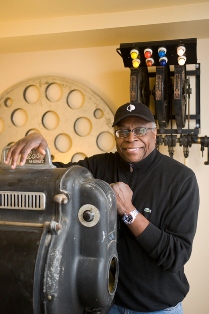 |
With many Black filmmakers struggling to get their work to the big screen, Ron Craig believes exposure to Black produced and directed films is as important as ever.
"Most people have not really had the opportunity to see or understand the African American contribution to film as an art form in this country," he says. "As far as for African Americans as a whole, people, a lot of times, don't get the opportunity to look into these cultural portholes to see what really happens. When you look from an artist's perspective, you're looking at their interpretation or their view. It broadens your scope of the different aspects of every day culture."
Craig is the founder of the Portland African American Film Festival, which will begin its fourth installment on Jan. 30. He hopes that attendees will not just get the opportunity to see films, but also get a sense of African American culture and what it has contributed to the industry.
The festival runs through Feb. 2 and features documentaries and dramas, as well as a youth film festival Saturday morning.
Craig, a Portland native and director himself, says there were only a few theaters that highlighted African American films when he was growing up. These theaters were limited to a specific neighborhood, he adds.
Craig had multiple opportunities to live in Europe and says he was inspired by the ability of all segments of society to tell their stories on film.
"If you were Egyptian in France there was a venue for Egyptian films," he says. "To me, that was fascinating because I had never seen it before and given the opportunity, that's what I wanted to do."
To date, he has produced three films, including the critically acclaimed "Searching for York."
Seven years ago, Craig founded the Astoria International Film Festival. Three years later, he narrowed the scope down to African Americans for a new festival in Portland.
He says the importance of these and other film festivals, in general, is that they provide audiences the opportunity to see films they most likely won't see anywhere else. In most cases, he says this is because the producers and directors don't have a combination of the financing, promotion, or distribution to get their work to a larger audience. While some films get distribution deals ("Fruitvale," a film about police brutality victim Oscar Grant, recently received a deal from the Weinstein Co. following its performance at the Sundance Film Festival), most are relegated to limited availability.
Craig says the economics are particularly important when it comes to Black filmmakers.
There's no shortage of stories of Black filmmakers struggling to find support for their visions in Hollywood. Spike Lee was recently replaced by Tate Taylor, director of "The Help," to do a James Brown biopic. Morgan Freeman has been struggling to get the real life story of Bass Reeves, who some have called the inspiration for "Django Unchained," to the big screen for over five years. This, however, pales in comparison to Danny Glover's struggle for 30 years and counting to put out a biopic on Haitian revolutionary Toussaint L'Overture.
"The last big film with an African American cast was 'Red Tails' and that was a George Lucas film and he had a sheer uphill battle to put that out," says Craig. "As far as having the resources, the thing about the Tuskegee Airmen is it was an incredible story, yet at the same time, every single story that's been told pretty much other than in print, has been a white organization to tell that story. Once again, it speaks to the economics."
Although some have seen the success of movies like "The Help" and "Django Unchained" as the latest phase of white filmmakers appropriating stories Black directors have been trying to tell for years, Craig sees them as an opportunity for dialogue.
"The Django, it's going to be controversial but I still applaud the fact that it's out there," he says. "It gives somebody some information so they can say, 'Maybe I should rethink this. Look at it again or try this or try that.' But if we don't get it out there nobody is going to address it."
The PDX African American Film Festival begins Jan. 30 at 7 p.m. at the McMenamins Mission Theater.
For more information on screenings and locations, go to the festival's website.












































































































































































































































































































